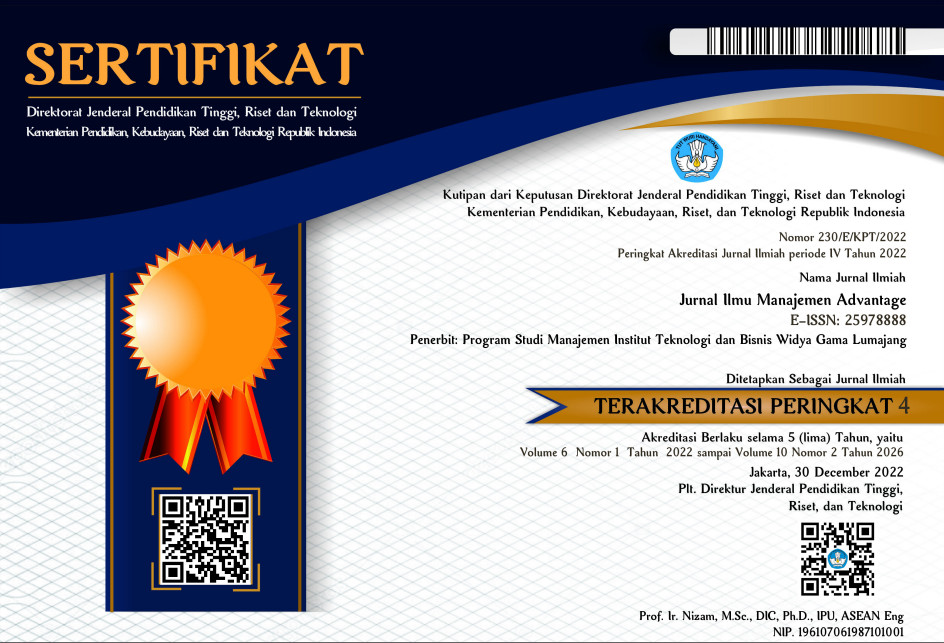Influence of HRM Factors on CWS Success in Foreign Countries
DOI:
https://doi.org/10.30741/adv.v8i1.1310Keywords:
COW, Human Resources, Foreign CountriesAbstract
This study aims to analyze the development, benefits, and implications of coworking spaces (CWS) as a flexible and collaborative modern work solution, as well as the factors influencing their success in various countries. Changes in the global economic system, driven by advancements in information and communication technology, have transformed work methods and increased the number of self-employed and freelancers. In response to this need, CWS have emerged as a solution providing flexibility, collaboration, and productivity support. CWS offer shared work environments for various professionals, including creative economy players, SMEs, freelancers, employees, executives, and students. This research employs qualitative and quantitative methods through a literature review involving sources from different countries. The growth of CWS in various cities worldwide brings legal implications requiring special regulations due to their distinct characteristics and usage purposes compared to traditional offices. Additionally, perspectives from human resource management, marketing, entrepreneurship, and legislation provide various recommendations for the future development of CWS, encompassing community, motivation, and collaboration. Overall, coworking spaces offer an innovative solution for modern work needs, support the development of the creative economy, and require specific attention in regulation and management to ensure their sustainability and growth
Downloads
References
Apriolita, & Eka, N. (2020). Strategi Komunikasi Lembaga Penyiaran Publik Lokal Radio Publik Kabupaten Sragen Buana Asri Sebagai Media Informasi Publik. IAIN SURAKARTA,
Asmarany, C. (2019). Co-Working Space Wadah Kreativitas Milenial. MINAT MANAJEMEN INFORMASI DAN PERPUSTAKAAN KAJIAN BUDAYA MEDIA SEKOLAH PASCASARJANA UNIVERSITAS GADJAH MADA, 36.
Asyhar, K., & Yunianto, R. (2019). Memahami Coworking Space (Ruang Kerja Bersama) Sebagai Konsep Baru Tempat Bekerja (Studi Pada Coworking Space di Kota Malang). Jurnal Ilmiah Mahasiswa Fakultas Ekonomi dan Bisnis Universitas Brawijaya, 7(2).
Capdevila, I. (2015). Co-Working Spaces and the Localised Dynamics Of Innovation In Barcelona. International Journal of Innovation Management, 19(3), 1-28. doi:10.1142/S1363919615400046
Dianovita, & Khoirunurrofik. (2020). The Distribution Pattern of Co-working Space in Jakarta and
Determinant Factors of Consumers’ Preferences on Location
Decision ICSDEMS - IOP Conf. Series: Earth and Environmental Science 1-9. doi:10.1088/1755-1315/436/1/012018
Diovitara, V. (2018). Revitalisasi Community Center di Taman Alun-Alun Kapuas Kota Pontianak dengan Pendekatan Ekologis Revitalization Community Center in Alun-Alun Kapuas Park Pontianak City Approach to Ecology.
Fernanda, M., & Frinaldi, A. (2023). Inovasi Budaya Organisasi Dalam Menciptakan Perilaku Inovatif Pegawai Pada Badan Kepegawaian Daerah Kabupaten Mandailing Natal. JISIP (Jurnal Ilmu Sosial dan Pendidikan), 7(2), 855-865.
Fiorentino, S. (2019). Different Typologies of ‘Co-Working Spaces’ And the Contemporary Dynamics Of Local Economic Development In Rome. European Planning Studies, 1-24. doi://doi.org/10.1080/09654313.2019.1620697
Fuzi, A. (2015). Co-Working Spaces For Promoting Entrepreneurship In Sparse Regions: the Case Of South Wales. Regional Studies, Regional Science, 2(1), 461-469. doi://dx.doi.org/10.1080/21681376.2015.1072053
Kartika, P. C. (2016). Rasionalisasi Perspektif Film Layar Lebar Beradaptasi Karya Sastra JURNAL PENA INDONESIA, 2(2), 141-158. doi://doi.org/10.26740/jpi.v2n2.p136-150
Nisrina, A., & Handoyo, A. (2021). Studi Coworking Space Bagi Milenial. Nature: National Academic Journal of Architecture, 8(2), 104-118.
Noviani, R., & Udasmoro, W. (2021). Politik Ruang: Spasialitas dalam Konsumerisme, Media, dan Governmentalitas: PT Kanisius.
Online, K. (2024). Kamus Besar Bahasa Indonesia
Prasetya, I. (2018). Coworking Space di Kota Yogyakarta dengan Pendekatan Prinsip-prinsip Fleksibilitas dalam Arsitektur. UAJY,
Savitri, & Astrid. (2019). Revolusi industri 4.0: mengubah tantangan menjadi peluang di era disrupsi 4.0: Penerbit Genesis.
Serfiyani, C. Y. (2020). Implikasi Hukum Perbandingan Konsep Co Working Space dengan Perkantoran dan Perindustrian Bagi Pelaku Usaha Rintisan di Indonesia. PERSPEKTIF, 25(1), 35-43.
Sia, E. C., Sitindjak, Irianto, R. H., Frans, & Melinda, S. (2019). Implementasi Konsep “Smart” pada Interior Co-working Space “Semarang Digital Kreatif” di Semarang. Intra, 7(2), 196-204.
Sukmanindya, Florentina, & Tantiana. (2020). Co-Working Space di Kota Salatiga.
Tambunan, & TH, T. (2021). UMKM di Indonesia: Perkembangan, Kendala, dan Tantangan: Prenada Media.
Wang, W., Liang, J., & Niu, J. (2022). Site Selection of Co-Working Spaces under the Influence of Multiple Factors: A Case Study in Hangzhou, China. Sustainability, 14(2), 1-18. doi://doi.org/10.3390/su14052676ht
Widuri, N. R., & Setiawan, M. (2021). Business Plan Co-Working Space Berbasis Layanan Informasi Ilmiah: Studi Pada Perpustakaan PDDI LIPI Kawasan Jakarta Shaut Al-Maktabah : Jurnal Perpustakaan, Arsip dan Dokumentasi 13(1), 28-42. doi:10.37108/shaut.v13i1.373
Yati, Q. H. (2023). Nilai Pada Coworking Space dalam Mendukung Konsep Kota Kreatif BSD City. Jurnal Rekayasa Lingkungan Terbangun Berkelanjutan, 1(1), 71-82.
Zhao, Z., Wang, J., & Hou, S. (2018). Research on the Influencing Factors of Co-working Space Development --A Case Study of Lvliang, Shanxi Province 2nd International Conference on Social Sciences, Arts and Humanities (SSAH 2018), 1101-1108.
Downloads
Published
How to Cite
Issue
Section
License
Copyright (c) 2024 Zainul Hidayat, Emmy Ermawati, Mimin Yatminiwati

This work is licensed under a Creative Commons Attribution-NonCommercial 4.0 International License.










